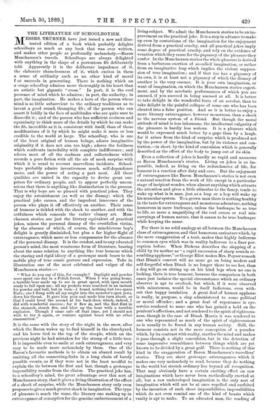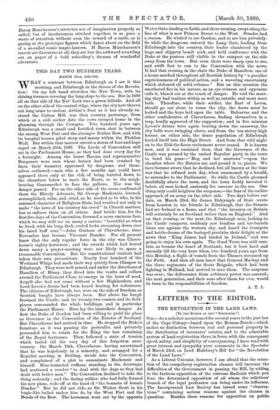M THE LITERATURE OF SCHOOLBOYISM. ESSRS. TROBNER have just issued a
new and illus- trated edition of a book which probably delights schoolboys as much as any book that was ever written,
and makes other people as profoundly melancholy,—Baron Munchausen's travels. Schoolboys are always delighted with anything in the shape of a portentous fib deliberately told. Apparently it is the deliberate impudence of it, the elaborate shamelessness of it, which excites in them a sense of sublimity such as no other kind of moral fiat succeeds in generating. There is nothing which an average schoolboy admires more thoroughly in his heart than an artistic but gigantic "cram." In part, it is the cool presence of mind which he admires ; in part, the audacity ; in part, the imagination. He makes a hero of the person whose mind is so little subservient to the ordinary traditions as to invent a good round, thumping fib ; of the person who can assert it boldly in the face of multitudes who are quite sure to discredit it ; and of the person who has sufficient coolness and equanimity to think more of the details by which he can make the fib, incredible as it is, consistent with itself, than of those modifications of it by which he might make it more or less credible to the world at large. The schoolboy, who is one of the least original of human beings, adores imaginative originality if it does not aim too high ; adores the boldness which confronts incredulity with complete indifference ; and adores most of all the coolness and collectedness which records a pure fiction with all the air of meek surprise with which it is usual to recount marvellous incidents. School- boys probably admire inventiveness much, self-dependence more, and the power of acting a part most. All these qualities are united in the capacity to devise great sur- prises for ordinary people, and to appear perfectly uncon- scious that there is anything like dissimulation in the process. That is why boys are so pleased with practical jokes. They enjoy the astonishment (as well as the dismay) which the practical joke causes, and the impudent innocence of the person who plays it off effectively on another. Their sense of humour is tickled with the shock to another, and with the artfulness which conceals the rather clumsy art. Mun- chausen stories are just the literary equivalent of practical jokes, minus the personal dismay of the crestfallen victim, by the absence of which, of course, the mischievous boy's delight is greatly diminished, but plus a far higher flight of extravagance, which more or less compensates for the absence of the personal dismay. It is the crudest, and to any educated person's mind, the most wearisome form of literature, bearing about the same relation to anything like true humour which the staring and rigid idiocy of a grotesque mask bears to the mobile play of true comic gesture and expression. Take in illustration one of the most celebrated and vulgar of the Munchausen stories :-
« What do you say of this, for example P Daylight and powder were spent one day in a Polish forest. When I was going home, a terrible bear made up to me in great speed, with open mouth ready to fall upon me; all my pockets were searched in an instant for powder and ball, but in vain—I found nothing but two spare flints ; one I flung with all my might into the monster's open jaws, down his throat. It gave him pain and made him turn about, so that I could level the second at his back-door, which, indeed, I did with wonderful success ; for it flew in, met the first flint in the stomach, struck fire, and blew up the bear with a terrible explosion. Though I came safe off that time, yet I should not wish to try it again, or venture against bears with no other ammunition."
It is the same with the story of the night in the snow, after which the Baron wakes up to find himself in the churchyard, and his horse tied to the top of the steeple, which on the
previous night he had mistaken for the stump of a little tree. It is impossible even to smile at such extravagances, and very easy to be made more melancholy by them. One of the Baron's favourite methods is to obtain an absurd result by omitting all the connecting-links in a long chain of barely possible events, as if they were not in the least needful to explain the tie between the first and last, though a grotesque impossibility results from the elision. The practical joke has, to a schoolboy's mind, the great advantage over this sort of Munchausen story, that it gives a living illustration of the effect of a shock of surprise, while the Munchausen story only even proposes to give a much greater shock in imagination. The type of pleasure is much the same, the literary one making up in extravagance of conception for the genuine embarrassment of a
living subject. We admit the Munchausen stories to be an im- provement on the practical joke. It is a step in advance to make up even by contortions of the imagination for the enjoyment derived from a practical cruelty, and all practical jokes imply some degree of practical cruelty, and rely on the evidence of vexation which they cause for the piquancy of the pleasure they confer. In the Munchausen stories the whole pleasure is derived from a barbarous exertion of so-called imagination, or rather from an imaginative leap which implies the violent suppres- sion of true imagination ; and if that too has a piquancy of its own, it is at least not a piquancy of which the dismay of another is the very essence. It is your own imagination, Or want of imagination, on which the Munchausen stories experi- ment, and by the acrobatic performances of which you are amused, if you succeed in being amused at all. It is better to take delight in the wonderful feats of an acrobat, than to take delight in the painful collapse of some one who has been cheated into a false position. And so it is better to enjoy a mere literary extravagance, however monstrous, than a shock to the nervous system of a friend. But though the moral attitude of mind is less inhumane, the intellectual vulgarity of the pleasure is hardly less serious. It is a pleasure which would be expressed much better by a gape than by a laugh, for it arises from the kind of surprise which is produced not by the power of the imagination, but by its violence and con- tortion,—in short, by the kind of convulsion which is generally described as the effort of the body to jump out of its skin.
Even a collection of jokes is hardly so vapid and nauseous as Baron Munchausen's stories. Living on jokes is as im- possible, indeed, as living on the redundancies of life, for humour is a reaction after duty and care. But the enjoyment of extravagances like Baron Munchausen's stories is not even a natural reaction from the work of life except in a particular stage of incipient wonder, when almost anything which attracts the attention and gives a little stimulus to the fancy, tends to wake up what is in man, just as a leap or a hop will wake up his muscular system. To a grown man there is nothing healthy in the taste for extravagance and monstrous adventure, nothing humorous in mere burlesque, unless the burlesque be so true to life, so mere a magnifying of the real errors or real mis- carryings of human nature, that it ceases to be true burlesque while keeping the name.
For there is no solid analogy at all between the Munchausen class of extravagances, and that humorous caricature which, by the mere exaggeration of a trait, makes that highly ludicrous to common eyes which was in reality ludicrous to a finer per- ception before. When Dickens describes the slapping of a child by its mother as " a rapid succession of sharp sounds re- sembling applause," or George Eliot makes Mrs. Poyser remark that Dinah's convert will no more go on being modest and self-forgetful when Dinah is no longer there to see her, than a dog will go on sitting up on his hind legs when no one is looking, there is true humour, because the comparison in both cases just isolates the special circumstance which an ordinary observer is apt to overlook, but which, if it were observed with minuteness, would be in itself ludicrous, even with- out that happy insulation. A great deal of human applause is really, in purpose, a slap administered to some political or moral offender; and a great deal of repentance is eye- service rendered to some one who has gained a hold on the penitent's affections, and not rendered to the spirit of righteous- ness, though in the case of Dinah Morris it was rendered to one who represented as much of the spirit of righteousness as is usually to be found in any human society. Still, the humour consists not in the mere conception of a paradox which, by its contrast with reality, startles the mind and makes it pass through a slight convulsion, but in the detection of some impressive resemblance between things which are yet known to be divided by a great gulf. There is nothing of this kind in the exaggeration of Baron Munchausen's travellers' stories. They are sheer grotesque extravagances which it makes one very melancholy to read, because they do nothing in the world but stretch ordinary lies beyond all recognition. That may obviously have a certain exciting effect on raw imaginations which have never been methodically exerted at all; but a raw undeveloped imagination is the only sort of imagination which will not be at once repelled and surfeited by the invention of such sheer impossibilities, impossibilities which do not even remind one of the kind of boasts which vanity is apt to make. To an educated man, the reading of
Baron Munchausen's stretches not of imagination properly so nailed, but of incoherences stitched together, is as pure a waste of attention, without even the reward of a smile, as is gazing at the grotesque figures which dance about on the field of a so-called comic magic-lantern. If Baron Munchausen's travels are literature at all, they are but the awkward scrawling out on paper of a bold schoolboy's dreams of wonderful adventure.



















































 Previous page
Previous page